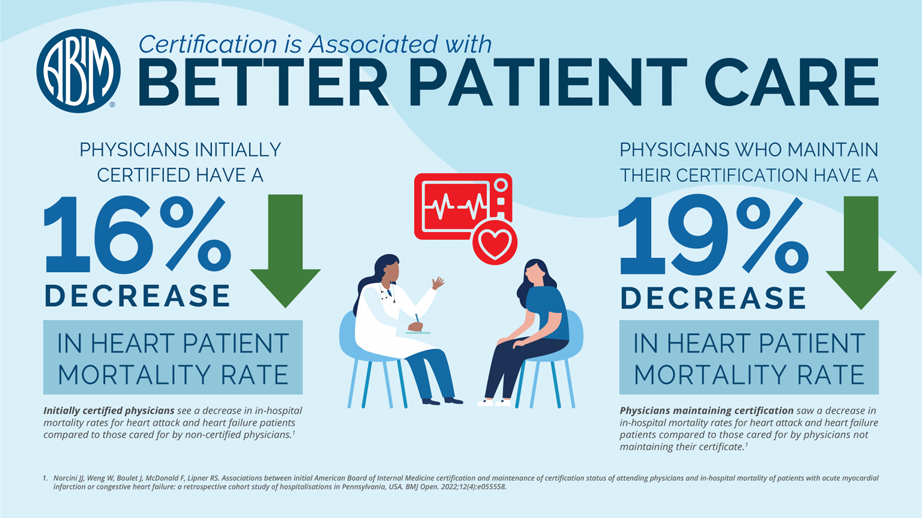In this edition of News & Notes …
- Letter from Rajeev Jain, Chair of ABIM’s Board of Directors
- Certification Exam Scores for New Doctors are Associated with Fewer Deaths and Hospital Readmissions
- LKA Used to Maintain 74,000 Certifications
- Have you Updated your Information on your Physician Portal?
- How Does ABIM Score Assessments?
- ABIM Welcomes New Members of Governance
- ABIM Council and Non-Physician Governance Member Openings: Application Deadlines Extended
- Deadline Extended to 8/15/24 to Change Which Certificate(s) you are Maintaining
Letter from Rajeev Jain, Chair of ABIM’s Board of Directors

Dear Colleagues,
There are a number of positive changes happening at ABIM, and I wanted to take the opportunity to reflect and share some recent news.
Last year, Dr. Richard Baron, our President and CEO, announced his intention to retire in the fall of 2024. I immediately appointed a search committee, chaired by Dr. Robert Roswell, Chair-Elect of the ABIM Board of Directors (BOD). The search committee evaluated many exceptional candidates nationwide and presented the BOD with three finalists.

With great enthusiasm, the Board unanimously selected Dr. Furman McDonald to be the next President and CEO of ABIM. As a practicing internist, former program director and husband of a full-time physician-scientist board-certified in radiology and investigating breast cancer, Furman is uniquely attuned to what physicians and patients want and need from ABIM’s credential. His vision for connecting meaningful certification programs to ABIM Board Certified physicians’ practice will be reflected in his work with physicians, medical societies and, most importantly, patients. Furman’s new role was announced earlier this summer, and you can learn more about him in a blog post he wrote about his experiences in medicine.

The transition in CEO leads to competing emotions of excitement for the future under Dr. McDonald’s leadership and regret that I will no longer work with Dr. Baron. Dr. Baron’s leadership and vision will be missed, but his impact will continue to resonate in American health care. Over the last decade as CEO of ABIM, Dr. Baron has led transformational change in governance, culture and the value of certification. The Longitudinal Knowledge Assessment (LKA®) is a shining example of his visionary change management while staying true to our collective North Star of promoting excellent patient care.
With Dr. McDonald moving into the CEO position, the search began for someone to fill his critical role as Senior Vice President for Academic and Medical Affairs. ABIM is very fortunate that Erica N. Johnson, MD, FACP, FIDSA, has agreed to step into the position. Dr. Johnson is uniquely qualified and comes to ABIM from Johns Hopkins Bayview Medical Center in Baltimore, where she was Program Director for the Internal Medicine Residency Program and is also Associate Professor of Medicine in the Division of Infectious Diseases at Johns Hopkins University School of Medicine.
Dr. Johnson is a voting member of the Accreditation Council for Graduate Medical Education (ACGME) Review Committee for Internal Medicine (RC-IM), where she gained a deep understanding of GME accreditation as well as certification. She is also a member of the Association of Program Directors in Internal Medicine (APDIM) Survey and Scholarship Committee for the Alliance for Academic Internal Medicine (AAIM). She currently serves as Secretary and Council Director on the ABIM BOD, as a member of the ABIM Council and as Chair of the ABIM Infectious Disease Board. I invite you to learn more about her work in Baltimore in a blog published when she was named Chair of the Infectious Disease Board in 2021.
I also know there has been, and continues to be, conversation regarding the value of certification as it relates to physician practice. The LKA has received tremendously positive feedback from the diplomate community, and continues to be a popular choice for physicians who want flexibility and the opportunity to learn as they are assessed. ABIM is continuing to look for ways to deliver assessment options that meet the needs of today’s practicing physician. I’m heartened by new, more discipline-focused assessments that will be coming in the future, including in hematology in 2026.
I can personally attest to the LKA experience, and wrote about how I have learned about other areas of medicine I don’t regularly see in a recent article published in Healio.
As always, thank you for all you do on behalf of the profession in service of patients everywhere.

Certification Exam Scores for New Doctors are Associated with Fewer Deaths and Hospital Readmissions
A recent study published in JAMA by Harvard Medical School and ABIM found that board certification exam scores are good predictors of patient outcomes in newly trained physicians.
Researchers analyzed almost 70,000 newly trained hospitalists treating Medicare beneficiaries during more than 455,000 hospitalizations between 2017 and 2019. They found that patients under the care of physicians who scored in the top 25% on the board certification exam exhibited an 8% lower risk of dying within seven days of hospital admission compared to those treated by physicians in the bottom 25%.
The study also looked at ACGME’s milestone ratings, designed to rate physician competencies including knowledge. Though milestone ratings might be helpful to programs, these ratings were not related to patient outcomes and therefore provide less useful information regarding the quality of recent graduates of internal medicine training programs.
Previous studies have shown hospitalized heart attack and heart failure patients die less frequently when treated by ABIM Board Certified doctors. They also show a strong link between a physician’s knowledge, as measured by the ABIM Maintenance of Certification (MOC) exam, and reductions in likelihood of patient death, emergency room visits or hospitalizations as well as a reduced chance of receiving an inappropriate opioid prescription.
LKA Used to Maintain 74,000 Certifications
Since its launch in 2022, more than 63,000 physicians have enrolled in the Longitudinal Knowledge Assessment (LKA®) in 17 disciplines, representing nearly 74,000 total certificates. The popularity of the LKA, which provides flexibility to take questions when and where convenient and an opportunity to learn as you go, has steadily increased, with more than 24,300 physicians choosing to enroll in an LKA in 2024.

As ABIM creates new focused assessments, more physicians are choosing them to maintain their certification. In the latest enrollment period, which ended in June 2024, 31% of new Internal Medicine LKA enrollees selected the Internal Medicine: Inpatient option. Additionally, more than 4,070 physicians switched to the new inpatient LKA from the general Internal Medicine LKA; more than 8,600 physicians total are now enrolled in the new inpatient assessment.
In 2026, in addition to the general hematology LKA, ABIM will introduce two new hematology focused assessments in the LKA—malignant hematology and classical (nonmalignant) hematology. ABIM continues to explore focused assessments in other specialties and will keep the community informed as they become available.
As a reminder, LKA participants receive progress reports (usually starting early in their second year once enough questions have been answered) to help them understand their performance in more detail and areas they may want to focus on in the future. Learn more about the Progress Reports on our website, and if you’re thinking about trying the LKA, we encourage you to read what other physicians are saying about their experiences.
Have you Updated your Information on your Physician Portal?

If you haven’t updated your information on your Physician Portal, please check out a new feature that allows you to easily self-identify your gender, race, ethnicity and heritage.
Listening sessions with diplomates made it clear that being able to accurately self-identify is vital—so we are providing more detailed options when compared to those typically available on forms like the U.S. Census. For example, rather than identifying as “Asian,” diplomates who choose to do so will be able to select “Central Asian,” “East Asian,” “Southeast Asian” or “South Asian.”
Updating your personal information is voluntary and will not be shared with other diplomates or the public. ABIM plans to use the anonymized data to add to the already rigorous work in to evaluating assessments for fairness and equity for all physicians.
How Does ABIM Score Assessments?
ABIM considers the process of scoring an assessment quite critical as it has large consequences for examinees. Scoring is a thorough and rigorous process that involves several steps that must occur before the actual scoring even begins. This includes a careful development of assessment items (questions) by practicing physicians and an intense scrutiny of each item that is developed by an Approval Committee consisting of physician experts practicing in the field.

After that comes an intensive statistical evaluation of the items and responses by psychometricians. Psychometrics, much like medicine, is a science of assessment and is governed by a set of guiding principles. In medicine, consensus-driven guidelines are used. Psychometrics uses the Standards for Educational and Psychological Testing, which outlines best practices in assessment, including those employed at ABIM.
Every aspect of the standards for testing is used in scoring an ABIM assessment—from item analysis and automatic test assembly to equating and standard-setting—to ensure that assessments measure knowledge accurately and fairly, questions have only one correct answer, and the score a physician receives is adjusted for the difficulty level of the test so the experience for examinees is similar across administrations. The ultimate goal of all ABIM assessments is to ensure they are fair and reliable, and have valid score interpretations.
The process of item analysis begins when each question is evaluated statistically using the examinee responses. The process involves two metrics: item difficulty and item discrimination. Item difficulty refers to how hard or easy an item is for examinees to answer correctly. Item discrimination is the correlation between item performance (correct or incorrect responses) and overall exam performance (an examinee’s total score).
This process ensures questions accurately measure physician knowledge, that any questions that have skewed results—for example, those scoring high on the overall exam respond incorrectly to an item while those scoring low on the overall exam respond correctly to that item—are flagged and reviewed by the experts and are potentially removed from scoring. This process confirms the validity and reliability of the assessment.

“The process ensures every assessment is fair and reflects current medical knowledge and practice,” said Rebecca Lipner, Ph.D., Senior Vice President of Assessment and Research. “Medicine changes at a rapid rate, and we want to make sure our assessments take that into account. Even more importantly, we want to make sure we are measuring what a group of practicing clinical experts in the specialty has determined is essential for physicians to know to practice in the field.”
Once initial processing and item analysis are complete and the team is confident that all questions are free from any known flaws and have a single best answer, the process of calibration and scoring begins.
ABIM uses Item Response Theory (IRT), typically considered best practice in the assessment and measurement field, to score its exams. IRT allows psychometricians to give scores that can be comparable across years and exam forms.
Medicine can change rapidly as new research and guidelines are published. In order to ensure the correct answers are in line with current best practices, an item analysis process is done. Psychometricians and exam developers review the results of the item analysis along with examinees’ comments to flag any items with potential issues. Information on potentially problematic questions is sent to the chair of the specialty’s Approval Committee for review. If the chair determines that there is not a single best answer to the question or there is a problem with the question, the item is subsequently removed from scoring.
“We do our best to make sure each assessment is comparable no matter when it is taken,” said Dr. Lipner. “The automatic test assembly and equating processes make sure that scores and standards are comparable across administrations. Scoring an assessment is a multi-step, thorough process that ensures that the results are fair, reliable and valid.”
More information about ABIM’s processes is available in a video series on YouTube or you can read about blueprints, item-writers and Approval Committees on the ABIM Blog. Learn how ABIM uses external scientists to validate that assessments measure what they’re supposed to.
ABIM Welcomes New Members of Governance
Every July ABIM welcomes new members to the Board of Directors, Council, Specialty Boards and Advisory Committees, Approval Committees and the Item-Writing Task Forces. They make sure our assessments are current and valid, our priorities remain focused on the needs of busy physicians and that we are implementing programs that are relevant and accessible. Learn more about new members of the Board of Directors and other governance bodies on ABIM.org.
ABIM Council and Non-Physician Governance Member Opening: Application Deadlines Extended
The ABIM Council—a cross-disciplinary policy-making governance body—has openings for an early career physician, a physician practicing in a non-university/community setting and a public (non-physician) member for an initial three-year term starting July 1, 2025. The application deadline is August 12. Learn more.
In addition, there are openings for non-physician public members (i.e., patients, patient advocates, caregivers and health care team members) on several ABIM Specialty Boards and the cosponsored Advisory Committees, also for initial three-year terms starting July 1, 2025.
The application deadline for all positions is August 12, 2024. If you know a patient or colleague who might be interested, please refer them to one of the openings below.
- Critical Care Medicine Board (patient/caregiver)
- Gastroenterology Board (health care team member)
- Geriatric Medicine Board (patient/caregiver)
- Hospice and Palliative Medicine Advisory Committee (patient/caregiver)
- Infectious Disease Board (patient/caregiver)
- Medical Oncology Board (health care team member)
- Nephrology Board (health care team member)
- Rheumatology Board (health care team member)
- Sleep Medicine Advisory Committee (health care team member)
Deadline Extended to 8/15/24 to Change Which Certificate(s) you are Maintaining
Your ABIM certification is a valuable signal to your peers and patients that you are an expert in your specialty. Maintaining certification takes commitment. We know for many physicians their practice changes over the course of their career and they may no longer wish to maintain certification in a discipline in which they no longer practice.
Having an active certificate allows ABIM to share with the world that you continue to be certified in that field and have demonstrated that you are doing the work of staying current. It also triggers fees to cover the work ABIM does to operate and maintain the various pathways you may choose from to demonstrate you have stayed current.
But you have a choice: you can deactivate any certificates you’ve earned. We’ve heard from some physicians that they were confused by or not aware of this option, so we’ve extended the deadline for 2024 to deactivate a certificate to 8/15/24.
Please know that simply choosing not to pay the annual Maintenance of Certification (MOC) fee will not automatically deactivate a certificate. You’ll need to inform ABIM that you intend to deactivate it via the Deactivate / Reactivate Form.
To deactivate a certificate, simply sign in to your Physician Portal at abim.org and complete the form found in the “My Assessments & Certifications” section of your Physician Portal home page. It will look like this:

Upon deactivation you will no longer be publicly reported as certified in that discipline and you will no longer be billed for future years.
If you deactivate your certificate by submitting the Deactivate / Reactivate Form by 8/15/24, we will:
- Credit your 2022, 2023 and 2024 annual MOC fees for the deactivated certificate to your ABIM account, if already paid; or,
- Remove your 2022, 2023 and 2024 annual MOC fees for the deactivated certificate, if not already paid.
Please note, ABIM cannot accommodate requests to credit/remove annual MOC fees for a certificate that is not deactivated, nor can we accommodate requests to credit/waive annual MOC fees before 2022. Any prepaid years for the deactivated certificate will be credited to your ABIM account.
If you have any questions about your certificate or the deactivation process we’re here to help at request@abim.org or 1-800-441-ABIM.




